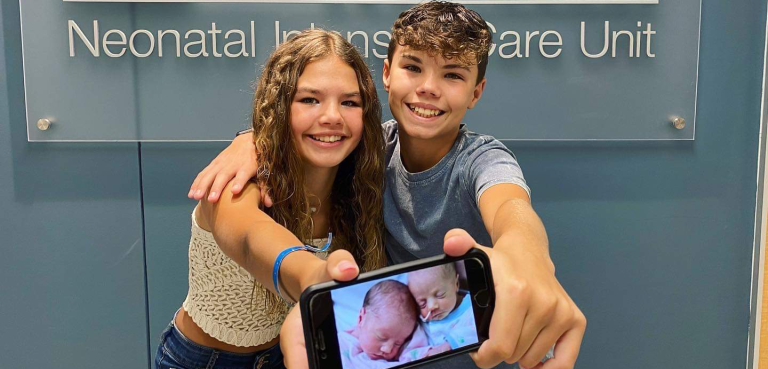April 1 is usually a day filled with good-natured fun. But for Alicia and Nick Eads, that day in 2010 took a more serious turn. Alicia was 20 weeks pregnant with twins, and she started having painful pre-term contractions.
The couple, who had already lost two pregnancies, rushed to the Labor and Delivery Triage at St. Elizabeth Edgewood Hospital. To be cautious, physicians immediately told Alicia to stay off her feet and reduce her stress.
“The doctors put me on bedrest and started me on medicine to stop me from having contractions,” says the now 42-year-old mother of three. “They were just a little concerned and wanted me to be able to keep the babies in as long as possible.”
Bedrest worked until just shy of her 36th week of pregnancy. Swelling and frequent headaches led doctors to diagnose Alicia with preeclampsia, pregnancy-related high blood pressure. To protect her health, her obstetrician decided to deliver her daughter Ellington and her son Alexander a few weeks early via C-section.
The babies were healthy. But like most premature twins, they needed a little extra help. So, on July 20, 2010, they began a 13-day stay in the St. Elizabeth Neonatal Intensive Care Unit (NICU), now a Level 3 nursery that offers advanced, specialized care.
A Little Extra Help From the NICU
Every prenatal checkup and ultrasound revealed two healthy, strong babies, says Nick.
“The babies always did well in utero. They were growing appropriately and there was never any concern or worry about them during the pregnancy,” he says. “Our daughter was feisty even then. On every ultrasound, she was always kicking her brother in some form or fashion. It was a funny interaction to see.”
At birth, however, Ellington and Alexander — now 13 — faced some of the same challenges that almost all newborn twins encounter. Ellington, born at 5 lbs. 5 oz., had jaundice, a build-up of too much bilirubin, the yellowish pigment from the breakdown of red blood cells. She needed several days of phototherapy with blue UV light in the NICU to help her liver process and remove the bilirubin.
Alexander, who weighed 4 lbs. 10 oz. at birth, needed a bit more help. He struggled to breathe initially and spent two days in an incubator with oxygen. He also needed help eating. Doctors used a nasogastric tube, a tube that is inserted through the nose and runs into the stomach, to ensure he got enough nutrition.
Still, like most babies, Ellington and Alexander fought to eat and gain weight after birth. After several days, Ellington also dropped into the four-pound range. Adding to the struggle, Alicia says she had difficulty producing breastmilk. So, the NICU nurses stepped in to make sure the babies’ weight didn’t fall dangerously low.
“Kathy, one of the NICU nurses, could get them to eat from the bottle like champions, and we were in amazement,” she says. “I wanted to cry because I never thought I could do this on my own. But it was a saving grace every time we would go into the NICU and see the nurses work. They were incredible with the babies and an enormous help to us.”
Ellington and Alexander stayed on a high-calorie formula. But thanks to the close, watchful care in the NICU, they were strong enough to go home after 13 days.
From NICU to Thriving Teenagers
Today, Ellington and Alexander show no signs of being premature infants or of having any early-life health struggles, Alicia says. Instead, they’re active middle schoolers with competitive spirits and a drive to excel.
“Our daughter and son quickly outpaced the preemie growth chart, and it was great to begin to see them grow and develop,” she says. “Watching them go from little four-pounders to thriving 8th graders has been wonderful.
As a teen, Ellington has channeled her feisty nature into a love of horseback riding and cheerleading. She cheers for Turkey Foot Middle School football and basketball teams. In addition, she participates in a competitive cheer squad through Premier Athletics NKY.
Alexander is equally as active, Nick says. As a younger child, he played tee ball. But in recent years, he’s focused on lacrosse. He also shines in academics. So far in middle school, he’s achieved the A-B honor roll twice and was recently selected for two advanced classes.
Unparalleled Care at St. Elizabeth Healthcare
Ellington and Alexander were almost full-term babies. Still, Alicia says they had health needs early on that required a specialized level of care that was only available in the St. Elizabeth NICU.
“St. Elizabeth offered us and our children advanced care,” she says. “And we were so lucky that it was almost in our backyard.”
The nurses and doctors in the NICU only took care of the twins for a couple of weeks, Nick says. But their compassion and knowledge put the Eads family on a healthy path.
“When you become a parent for the first time, it can be quite the experience — especially when you have twins who need extra special care,” he says. “St. Elizabeth gave us the confidence we needed as new parents to feed and take care of preemies. You can read about that in a textbook, but until you get firsthand experience, you don’t know what goes into it all. We felt like everyone in the NICU took great care of us. We’re so very thankful for that.”

